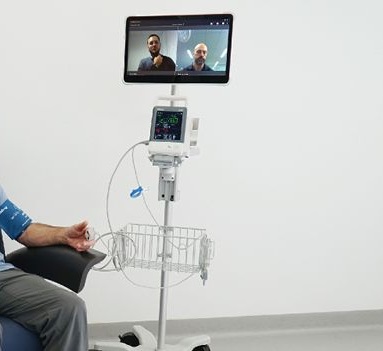
Mobility technology has drastically and quickly changed healthcare in recent years, providing previously unheard-of chances to improve patient outcomes, expedite processes, and improve the overall experience. The latest innovations of mobile tablets and their seamless integrations with medical carts are considered powerful tools that revolutionize patient care by addressing issues in enhanced mobility, efficiency, and workflows in healthcare settings.
Mobile medical tablets conform with HIMSS’s mission in using information technology to enhance healthcare. By improving mobility and offering real-time access to patient data, these versatile computers facilitate greater care coordination, faster response times, and enhanced decision-making at the point of care.
The Power of Mobility
In the healthcare industry, mobility technology is a paradigm change that is redefining operational excellence and patient care standards. Traditionally, healthcare providers and workers rely on bulky working stations and desktop computers, which make it difficult to move around and provide efficient patient care. To satisfy these needs and expectations of modern patients, healthcare professionals must include mobile technologies.
The All-in-One Advantage:
- Increased Mobility: Due to their reduced weight and compatibility with thinner carts, medical tablets are easily transportable, thus enhancing mobility in healthcare environments, facilitating easier movement and better workflow.
- Space Optimization: Slimmer carts take less floor space, contributing to a more efficient use of hospital resources. This is particularly important in crowded emergency departments and intensive care units where space is frequently limited.
- Improved Workflow: Mobility solutions promote improved departmental communication, enabling a more integrated approach to care and avoiding delays that may have an impact on patient outcomes.
Integration and Interoperability
HIMSS strongly emphasizes the critical role of data interoperability in enabling seamless data exchange across the healthcare ecosystem. Medical tablets, when integrated with interoperable systems, facilitate the secure and timely sharing of patient information among providers, improving care coordination and enhancing patient outcomes.
Cart Integration
Integrating medical tablet functionality with medical IV bag carts enhances efficiency by providing real-time access to patient information, medication administration protocols, and electronic documentation directly at the point of care, streamlining workflows, and reducing the risk of medication errors.
- IV Bag Compatibility: Medical carts can store medication, transport supplies, hold IV bags, and mount medical tablets at the same time.
- Medication Integration: Seamless integration with medication dispensing systems and electronic health records (EHRs) through medical carts and tablets allows for automated medication reconciliation, reduced transcription errors, and improved safety in dispensing medication.
Tailoring to User Needs
While “Bigger is Better” for some, mobile medical tablets in healthcare are tailored with careful consideration of user needs.
- Device Size and Portability: While larger screens are beneficial for tasks like reviewing medical images or entering detailed documentation, they can be cumbersome to move around. Medical staff may prefer smaller, more portable medical tablets for quick access to patient information on the go.
- Ergonomics and Positioning: Medical tablets can be mounted on medical carts with adjustable stands and docking stations that optimize ergonomics and ensure comfortable use of the tablet for different user roles and tasks.
- Software Optimization: Mobile medical tablets have user-friendly interfaces and intuitive software applications that are essential for maximizing the effectiveness and usability of mobile tablets in the healthcare setting.
The integration of mobile tablets aligns perfectly with HIMSS’s mission to optimize health and healthcare through information technology. By enhancing mobility and enabling real-time access to patient data, these powerful systems facilitate improved patient care, increased efficiency and productivity, and enhanced data security and compliance.
Mobile tablets and their integration with medical carts represent a significant advancement in healthcare technology. By facilitating seamless data exchange, these technologies are empowering healthcare providers to deliver better patient care.
As technology continues to evolve, we can expect to see even more innovative solutions that leverage the power of mobility to transform the future of healthcare.

